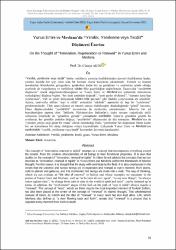Yunus Emre ve Mevlana’da “yenilik, yenilenme veya tecdit” düşüncesi üzerine
Künye
Akın, C. (2021). Yunus Emre ve Mevlana’da “Yenilik, Yenilenme veya Tecdîd” Düşüncesi Üzerine . Afyon Kocatepe Üniversitesi Sosyal Bilimler Dergisi , Yunus Emre ve Türkçe Özel Sayısı , 16-24 . DOI: 10.32709/akusosbil.949885Özet
“Yenilik, yenilenme veya tecdit” bütün varlıkların yaratılış özelliklerinden işlevsel özelliklerine kadar, yaratıcı dışında her şeyi içine alan bir kavram olarak karşımıza çıkmaktadır. Evrenin ve insanın atomlardan, hücrelerden gezegenlere, galaksilere kadar her an genişleme ve yenilenme içinde olduğu ayetlerde de vurgulanmış ve varlıkların hâlden hâle geçirildiğine değinilmiştir. Tasavvufta “yenilenme düşüncesi” olarak değerlendirebileceğimiz ve Yunus Emre ve Mevlana’nın şiirlerinde örneklerine rastladığımız düşünce biçimi, “her dem yeninden doğmak”, “yeni şeyler söylemek”, “zamana karşı hep yenilenmek”, “ruh ve gönül dünyasında hâlden hâle geçmek” gibi ifadeler çerçevesinde ele alınabilir. Ayrıca, tasavvufta sûfinin “seyr ü sülûk” yolundaki “tekâmül” aşamaları da hep bir “yenilenme” gerektirmektedir. Türk tasavvufunun en önemli unsuru olabileceğini düşündüğümüz “gönül” kavramı, İslam düşüncesindeki “yenilenme” kavramının da merkezine oturtulmuştur. İslam’ın bin yıl bayraktarlığını yapmış olan Türklerin, Türkistan’dan Balkanlar’a kadar uzanan coğrafyada etkili olmasının temelinde de “gönüllere girmek” yatmaktadır denilebilir. İslam’ın gönülden gönüle bu yenilenişi, her gönülde yeniden doğuşu, “yenilenme” düşüncesini de diri tutmuştur. Mevlana’nın da “yeniden yeniye akıp giden bir ırmak” olarak tanımladığı ömür, “yenilenme”nin doğumdan ölüme kadar her an tekrarlanan bir süreç olduğunu ortaya koymaktadır. Çalışmada Yunus Emre ve Mevlana’nın eserlerindeki “yenilik, yenilenme veya tecdit” kavramları üzerinde durulacaktır. The concept of “innovation, renewal or tajdid” emerges as a concept that encompasses everything except the creator, from the creation characteristics of all beings to their functional properties. It is seen that studies on the concept of "innovation, renewal or tajdid" in Islam do not address the concepts that we can describe as "innovation, renewal or tajdid" in Yunus Emre and Mevlana within the framework of Islamic thought. For this reason, it is thought that the study will contribute to the field. It is also emphasized in the verses that the universe and human beings are in expansion and renewal at every moment, from atoms, cells to planets and galaxies, and it is mentioned that beings are made into a state. The way of thinking, which we can evaluate as “the idea of renewal” in Sufism and whose examples we encounter in the poems of Yunus Emre and Mevlana, such as “to be born all over again”, “to say new things”, “to always renew against time”, “to change from state to state in the world of spirit and heart”. can be summed up in terms. In addition, the "evolvement" stages of the Sufi on the path of "seyr ü sulûk" always require a "renewal". The concept of "heart", which we think may be the most important element of Turkish Sufism, has also been placed at the center of the concept of "renewal" in Islamic thought. This wholehearted renewal of Islam, its rebirth and the idea of "renewal" in every heart has also kept alive. Life, which Mevlana also defines as "a river flowing back and forth", reveals that "renewal" is a process that is repeated every moment from birth to death.
Kaynak
Afyon Kocatepe Üniversitesi Sosyal Bilimler DergisiCilt
23Sayı
Yunus Emre ve Türkçe Özel SayısıBağlantı
https://dergipark.org.tr/tr/pub/akusosbil/issue/65941/949885https://hdl.handle.net/11630/10563



















